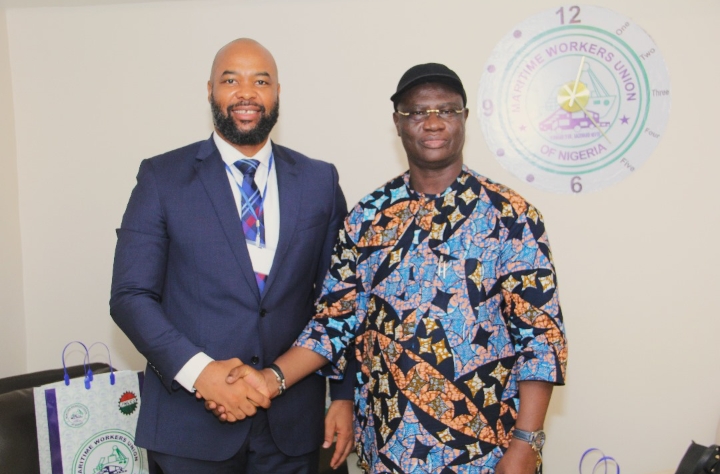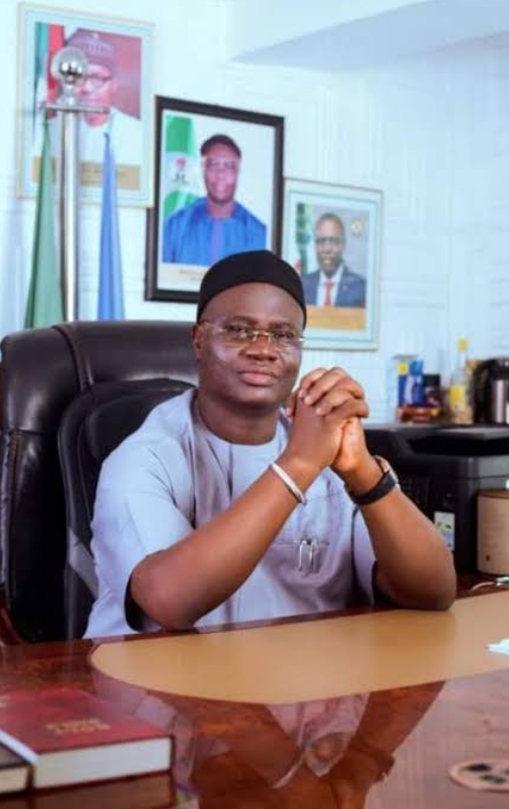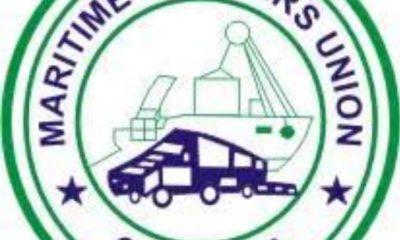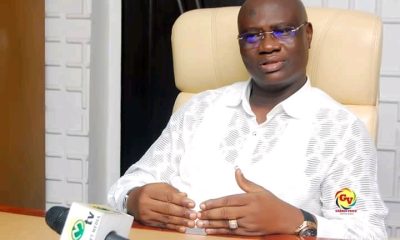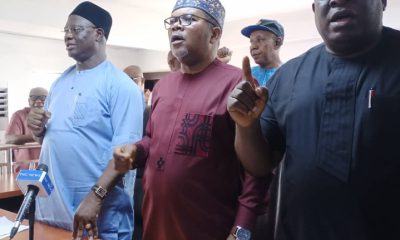Maritime Agencies
Blue Economy in Focus as MWUN Launches “Maritime Labour Voice” in Lagos.
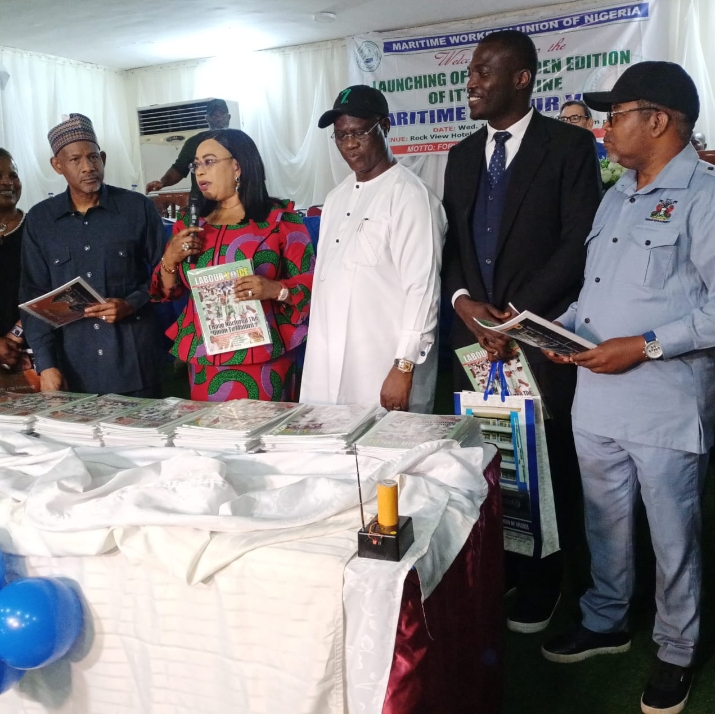
By Izuchukwu Ozoemena
The Maritime Workers’ Union of Nigeria, (MWUN) has given special tribute to employers of dockworkers, regulators and other stakeholders who, by the special attention they are giving to the wellbeing of the labour force under them, are enormously contributing to the stability and growth of the maritime sector.
MWUN President-General, Prince Adewale Adeyanju stated this in Lagos, Wednesday, at the unveiling of “Maritime Labour Voice”, the Union’s inhouse publication.
He stated that the primary purpose of the magazine is to provide a strong voice from the dock labour force on how best to contribute in promoting a harmonious working environment that would stimulate industrial peace as the medium represents what he referred to as “the voice of the voiceless.”
Delivering a special lecture on the topic “The Marine and Blue Economy: It’s Impact on Maritime Workers,” foremost maritime lawyer, Barr. Osuala Nwagbara described maritime workers and seafarers as the engine room and eyes with which the maritime industry sees. A clean and unpolluted ocean, he explained, has a lasting effect on seafarers.
“According to the United Nations, 40% of the world population live near coastal areas; 80% of world trade is achieved using the seas. The oceans, seas and coastal areas contribute to food security and poverty reduction. And yet, the ocean is under severe threat by human activities, where economic profit are at the expense of environmental degradation.
“Acidification, pollution, ocean warming and fishery collapse are just some of the examples of the consequences on the marine ecosystem. These threats are detrimental to the planet and have long term repercussions that demand urgent action to protect the oceans and the people who depend on them.”
Nwagbara counselled a viable use of the ocean economy in line with the concept of blue economy to sustain life on earth. This ocean economy entails the oceans, seas and marine resources conservation, sea pollution reduction and decarbonised shipping, he told the quality audience.
“In 2015, all United Nations Member States adopted a development policy on sustainability which centers around the 17 Sustainable Development Goals (SDG). The 17 goals provide a global blueprint for peace and prosperity of people and the planet and are set to be achieved by 2030. Goal 14, titled Life Below Water, concerns conservation and sustainable use of the oceans, seas and marine resources for sustainable development, and demands international cooperation for the oceans to get back in balance.”
Reaching Goal 14 requires universal action to protect the planet and require the collaboration of global and regional blocs within the international community and requisite legal frame work for its implementation.”
The oceans and seas are a main source of food, energy and minerals, and are being used for different purposes. Common examples are fisheries and aquaculture, and the processing and trade of these resources. The maritime transport also plays a big role in the global market in the form of containerships, tankers, and ports for the vessels. Furthermore, coastal tourism is the largest business within ocean activities in terms of employment.”
He recommended the
enforcement of globally applicable IMO rules by flag States and port States, national laws and regulations by national Maritime Administrations, as applicable. The importance of this lies in promoting and driving the marine and blue economy. Effective promotion of marine and blue economy will have a positive impact on Maritime Workers, he explained.
In his remarks, Comrade Charles Agada, Port Manager, Apapa Port, hailed the MWUN and its leadership for coming up with the idea of an inhouse voice as “Maritime Voice” symbolizes the strength of the Maritime Worker’s Union. The entire gamut of port operations is embedded in the new Ministry, he restated.
NPA’s Mrs. Sarah Bala who stood in for the MD described the Blue Economy as a game changer in Nigeria. To Mrs Bala, the Assistant Director, Corporate and Strategic Communications in the agency, “everything you see in the country is a product of the Blue Economy”.
She commended the MWUN for coming out with a magazine and urged that the tempo be sustained.
The Chairman of the event, Dr (Mrs) Vicky Haastrup, President, Seaport Terminal Owners Association of Nigeria (STOAN) lauded MWUN for contributing immensely to the growth and development of the Nigerian economy. “If the right policies are made and the right things are done, the maritime sector can solve the economic problems of Nigeria”, the Executive Vice Chairman of ENL Consortium Ltd stated. She praised the leadership of MWUN for the wonderful initiative of publishing a magazine which is timely and designed to richly contribute to the growth of the industry.
Maritime Agencies
OIL FACILITIES PROTECTION: Tompolo’s Tantita Acquires High-Tech Drones From US Firm.

By Izuchukwu Ozoemena
Tantita Security Services Ltd (TSSL), the company in charge of security surveillance over oil and gas installations in Nigeria’s Niger Delta region, is in collaboration with Textron Systems Corporation, a United States–based defence and aerospace company, to supply her three advanced Aerosonde Mk. 4.7 Vertical Takeoff and Landing (VTOL) uncrewed aircraft systems (UAS).
TSSNL owned by Chief Government Ekpemupolo (popularly known as Tompolo) disclosed the business deal in her website publication of December 29, 2025. The drones will be delivered in a fully ITAR-Free configuration.

The Aerosonde Mk. 4.7 is designed to operate without runways, utilising hybrid quadrotor technology that enables vertical takeoff and landing, as well as fixed-wing flight.

The Aerosonde Mk. 4.7 VTOL UAS, Textron Systems says, is a mature, industry-proven autonomous platform known for its high reliability and operational flexibility. Its dual-mode capability allows it to operate seamlessly in complex and high-risk environments, making it well-suited for security operations within Nigeria’s oil and gas sector.
Giving further insight into the contract, Senior Vice President, Air, Land and Sea Systems at Textron Systems, David Phillips, said the deployment would significantly enhance Tantita’s operational capability.
”The Aerosonde Mk. 4.7 VTOL UAS is a proven solution that will enable Tantita Security Services to expand its capabilities to protect the oil and gas infrastructure essential to Nigerian security and prosperity,” he stated.
The Aerosonde platform has accumulated over 700,000 flight hours across some of the world’s most challenging operating environments, underscoring its reliability and performance.
Tantita Security Services is expected to deploy the systems to strengthen surveillance and protection of critical oil and gas assets across Nigeria.
The contract also includes options for operator training and the supply of additional aircraft to support future capability expansion. Textron Systems noted that the agreement builds on a previous Foreign Military Sale (FMS) contract to Nigeria, further highlighting its ongoing commitment to supporting Nigerian security operations.
Textron Systems is a global leader in uncrewed air, land and sea systems, with the Aerosonde family of UAS currently supporting international customers and operations aboard more than 10 U.S. Navy ships. The company is a subsidiary of Textron Inc. (NYSE: TXT), a diversified multinational with interests spanning aviation, defence, industrial manufacturing and finance.
With multiple payload configurations and comprehensive training and support services, the Aerosonde Mk. 4.7 VTOL UAS offers a versatile and efficient solution for security operations in demanding environments, reinforcing Tantita Security Services’ role in safeguarding Nigeria’s critical energy infrastructure.
Maritime Agencies
NEW YEAR CELEBRATION: MARAN Appreciates Stakeholders, Requests Greater Support and Collaboration in 2026.
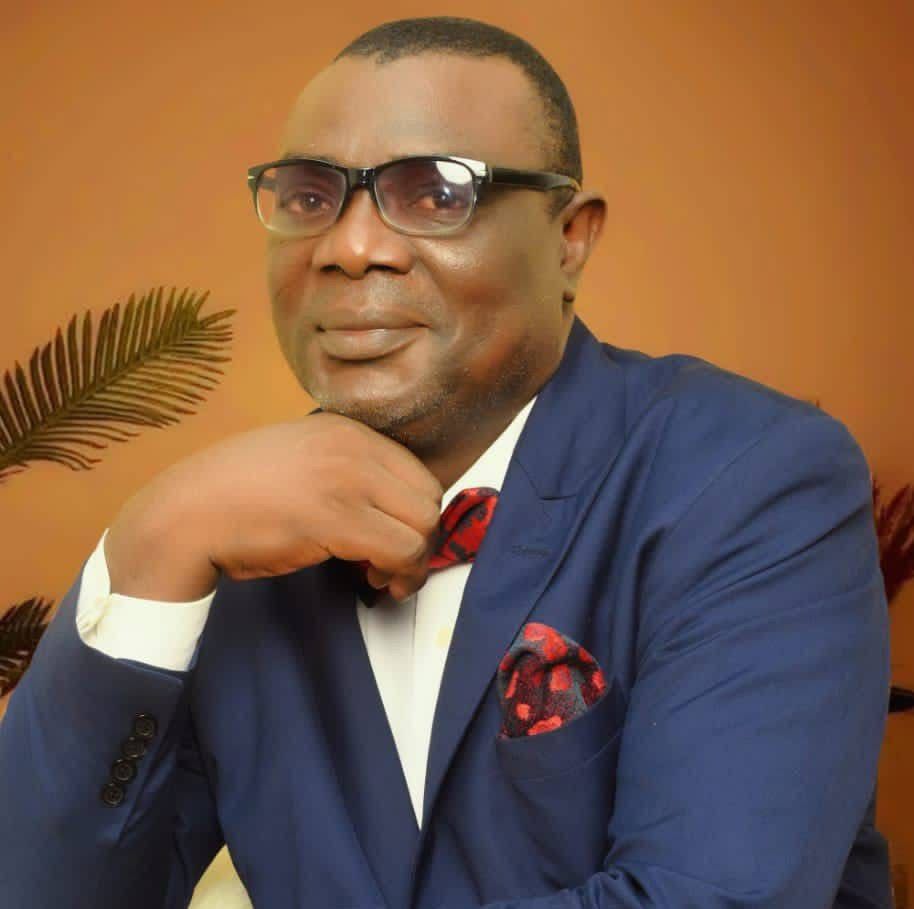
By Izuchukwu Ozoemena
As Nigeria joins the rest of the world to celebrate a brand new year, the pioneer maritime journalists’ group, the Maritime Reporters Association of Nigeria (MARAN), has implored the entire business community, especially maritime industry stakeholders, to join the association afresh in advancing the cause of the industry to ensure more impact and relevance in the national economy in the new year and beyond.
In a New Year message, MARAN Chairman, Mr. Tunde Ayodele described 2026 as a “year of greater impact,” stressing the need for improved service delivery and more robust maritime reportage to support national development.
According to him, the collective efforts of stakeholders in the outgoing year contributed positively to the growth of the maritime sector, urging all parties to sustain the spirit of unity and collaboration in the new year.
“United, we can make Nigeria proud by contributing our quota to national development, each from our own little corner,” the MARAN chairman said.
Ayodele reaffirmed MARAN’s readiness to collaborate with organisations and institutions across the maritime value chain, noting that such partnerships are crucial to making Nigeria’s maritime space one that is admired and celebrated.
He expressed appreciation for the cooperation and support extended to the association throughout 2025 and called for renewed commitment in the year ahead.
“Thank you for your cooperation and support in 2025. Let us do it again in 2026,” he added.
Maritime Agencies
NIGER DELTA SECURITY : Tantita Arrests 4 Oil Thieves, Nabs Vessel .
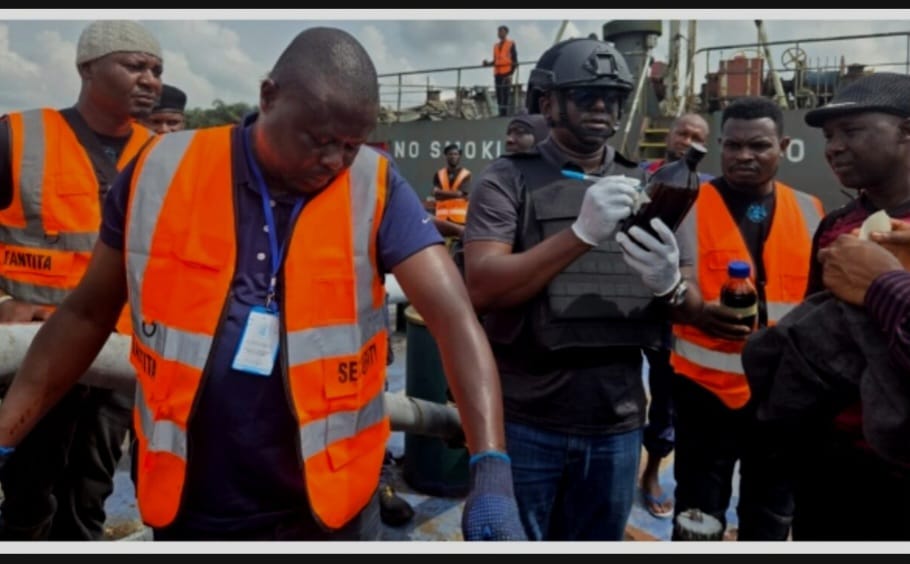
By Izuchukwu Ozoemena
In the ongoing efforts to thwart economic sabotage in the Niger Delta, Tantita Security Services Ltd, the firm engaged in pipeline surveillance operations in the oil -rich region, has nabbed four suspected oil thieves, intercepting their vessel named MT Thor. Suspects are to undergo trial for economic sabotage .
Speaking at the handover of the suspects at Koko Port, Tantita’s Executive Director of Operations, Capt Warredi Enisouh, said the suspects were apprehended with an unspecified quantity of suspected illegally-sourced petroleum products aboard the vessel.
The interception occurred on 15 December 2025, around the Koko–Excravos axis of Delta State, says a situation report made available by the Special Prosecution Team (SPT) of the Inter-Agency Task Force on Petroleum Product Theft.
The report stated that Tantita alerted the Head of Investigation of the SPT after intercepting MT Thor, allegedly laden with crude oil obtained through illicit means.
It was further alleged that the vessel was being escorted by personnel of the Police Marine Unit, Delta State, who reportedly claimed they were acting on directives from the Force Intelligence Department (FID), Abuja.
Preliminary investigations by law enforcement agencies revealed that the vessel, now classified as an exhibit in an ongoing criminal investigation, is linked to a jetty operated by Ebenco Global Services Limited. Investigation officers disclosed that documents and correspondence connected to the jetty were obtained and are currently under review.
“The owner of the jetty, Mr. Ebenezer, was contacted by investigators and reportedly provided additional documents, including court orders, which are also being analysed as part of the investigation.
“On December 16, a joint investigation team led by the Head of Investigation of the SPT conducted a Joint Inspection Visit in Koko. The team first met at Tantita’s corporate headquarters in Warri for a briefing, which was also attended by the jetty owner.
“During the inspection, investigators attempted to obtain samples from MT Thor but were unable to do so immediately as the vessel had not yet arrived at the jetty, having been towed from an earlier location by security operatives.
“While awaiting the vessel’s arrival, the team inspected other containers suspected to be carrying crude oil within the premises of Ebenco Global Links Limited, where samples were taken from a storage barge.
“MT Thor eventually berthed at about 8:30 p.m. on 16 December, prompting the joint team to adjourn sampling and other procedures until the following day. As of 17 December 2025, investigators were reported to be en route to Koko to continue sample collection and complete investigation formalities,” the report read.
Receiving the suspects, the Head of the Special Prosecution Team of the Inter-Agency Task Force, Omar Sini, reaffirmed the Federal Government’s resolve to dismantle crude oil theft networks in the Niger Delta, assuring that all findings would be thoroughly examined and prosecuted in line with the law.
-

 Maritime Agencies2 weeks ago
Maritime Agencies2 weeks agoOIL FACILITIES PROTECTION: Tompolo’s Tantita Acquires High-Tech Drones From US Firm.
-
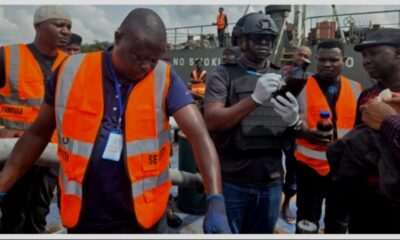
 Maritime Agencies3 weeks ago
Maritime Agencies3 weeks agoNIGER DELTA SECURITY : Tantita Arrests 4 Oil Thieves, Nabs Vessel .
-
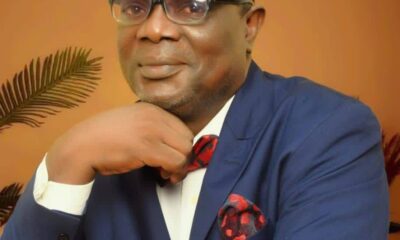
 Maritime Agencies2 weeks ago
Maritime Agencies2 weeks agoNEW YEAR CELEBRATION: MARAN Appreciates Stakeholders, Requests Greater Support and Collaboration in 2026.


